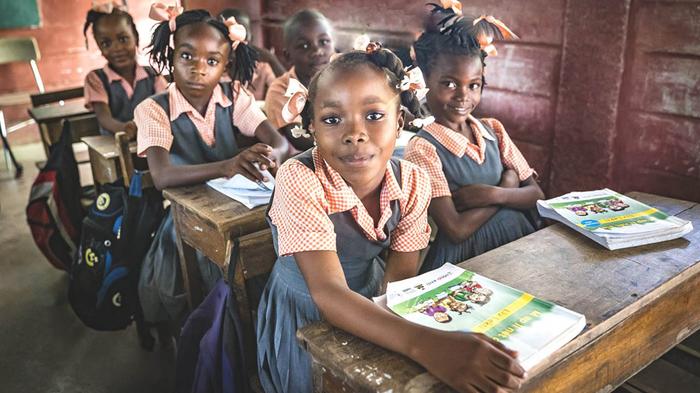A new study by a team of University of Notre Dame researchers makes a significant contribution to understanding the factors that influence how young elementary school students respond to reading interventions in fragile and low-income contexts.

Credit: University of Notre Dame
A new study by a team of University of Notre Dame researchers makes a significant contribution to understanding the factors that influence how young elementary school students respond to reading interventions in fragile and low-income contexts.
The study, published in the Comparative Education Review, evaluated an early-grade literacy intervention in Catholic schools in Haiti. The study has important implications for addressing educational inequities and improving learning outcomes to create opportunity and lift millions of children globally out of poverty.
“This research brings greater attention to questions of educational equity in the acquisition of foundational skills,” said lead author TJ D’Agostino, assistant professor of the practice with the Pulte Institute for Global Development, part of the University of Notre Dame’s Keough School of Global Affairs. “Which populations are being well served, which can we serve better, and how do we accomplish that? These findings can help guide future research and policy to expand literacy rates in low- and middle-income countries.”
Past research has shown that achieving reading comprehension by the end of second grade is crucial to progressing in school, which impacts future life opportunities, D’Agostino said. Some studies suggest achieving universal literacy could reduce global poverty by more than 10 percent.
Schools participating in the study received specialized teacher training as well as a curriculum in Haitian Creole and French that included a collated library. The curriculum included time for teachers to read aloud to students as well as time for students to read on their own. A group of coaches regularly visited participating schools to share best practices and evaluate what worked.
The study identified several factors that affected outcomes, including:
-
Instructional time (which suffered in some schools because of high rates of student and teacher absenteeism)
-
Curriculum uptake (whether teachers adhered to the new curriculum or instead mixed and matched it with more familiar resources)
-
School leadership (which was crucial to protecting time for learning, encouraging teacher buy-in to the program and providing extra support for students)
Researchers found that rural schools faced particular challenges, D’Agostino said, since they were more remote, received fewer coaching visits, tended to serve more marginalized populations and often experienced higher rates of student absenteeism.
A Haitian boy reads at school as part of a literacy intervention evaluated by Notre Dame researchers. The team’s work can inform the global work of major literacy donors such as USAID.
D’Agostino worked with fellow co-authors Danice Brown Guzmán and Paul Perrin of the Keough School’s Pulte Institute; Anasthasie Liberiste-Osirus, a training and technical assistance consultant who previously worked with Notre Dame’s Global Center for the Development of the Whole Child (GC-DWC), part of the University’s Institute for Educational Initiatives; and Kate Schuenke-Lucien of the GC-DWC.
The literacy intervention and research to evaluate its impact was supported by the GC-DWC Haiti in collaboration with Catholic Relief Services, the Catholic Church in Haiti, USAID, the W.K. Kellogg Foundation and an anonymous foundation. The program served more than 100,000 first- through third-grade students in nearly 350 schools between 2016 and 2020.
Ultimately, the study helped the Notre Dame team identify questions for future research, the co-authors said, and can inform future literacy interventions by organizations such as USAID, which is the largest bilateral donor of basic education assistance and works in more than 50 countries.
“Improving literacy skills in the school environment is an important part of a broader, deeper set of outcomes needed to address poverty,” Schuenke-Lucien said, noting that researchers sought to engage students holistically using home and church resources as well.
D’Agostino agreed. “It is deeply rewarding to contribute to programs that help people in marginalized communities develop life-changing skills,” he said, “and it is energizing to be a part of Notre Dame’s larger work to fight poverty.”
Contact: Tracy DeStazio, associate director of media relations, 574-631-9958 or [email protected]
Journal
Comparative Education Review
DOI
10.1086/728393
Method of Research
Randomized controlled/clinical trial
Subject of Research
People
Article Title
Explaining Variation in Treatment Effects: An Impact Evaluation and Mixed-Methods Study of Variation in Early Grade Reading Program Effects
Article Publication Date
6-Feb-2024




